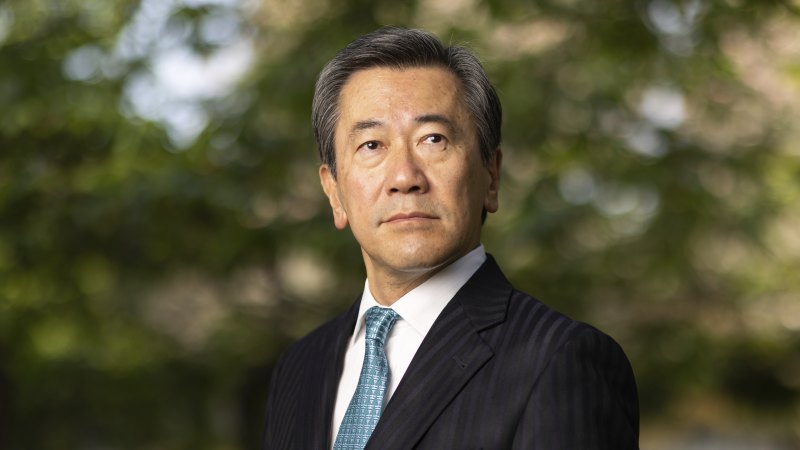
Time running out to prevent war over Taiwan, Japanese ambassador warns
04/26/2023Save articles for later
Add articles to your saved list and come back to them any time.
Time is running out for Australia and other democracies to deter China from launching an invasion of Taiwan, Japan’s departing ambassador to Australia has warned.
Shingo Yamagami, whose Canberra posting ends this weekend after almost 2½ years, accused his Chinese counterpart of launching a character assassination against him and rejected suggestions in the diplomatic community he had been called back to Tokyo early because of his outspoken style.
Describing a possible Chinese invasion of Taiwan as an increasing concern, Shingo Yamagami said: “My point is: time is running out.”Credit: Alex Ellinghausen
Australians needed to abandon outdated stereotypes that Japanese diplomats would be placid and softly spoken, he said.
As the Albanese government seeks to stabilise the nation’s diplomatic and trade relationship with Beijing after years of tension, Yamagami urged Australia not to overlook the risk China posed to peace and security in the Asia-Pacific.
Describing a possible Chinese invasion of Taiwan as an increasing concern, Yamagami said: “My point is: time is running out.
“Time is quite limited because our response has been slow. So rather than letting our counterpart think they see a window of opportunity to resort to military action, we have to do our best to narrow or even close that window of opportunity.
“That is why we need to come up with prompt action in terms of increasing our deterrence.”
Yamagami said Japan and Australia must prepare for the possibility that China would invade the self-governing island, which it claims as an inalienable part of its territory.
“If you look at past history, deterrence could fail,” he said in an interview at the Japanese embassy in Canberra.
The government’s defence strategic review, released this week, declared China was threatening Australia’s national interests by undermining the rules-based order in the Indo-Pacific and failing to be transparent about its dramatic military expansion.
The most dramatic moment in Yamagami’s tenure came in January when Chinese ambassador Xiao Qian claimed he was not doing his job and accused him of trying to drive a wedge between Beijing and Canberra.
Yamagami, who is regularly described as a China hawk, said he had restricted his comments to “policy matters of substance” between Japan and China.
“But when I’m engaging in that serious business, I get a sniper shot in the form of character assassination,” he said.
“That is totally uncalled for, not productive at all.”
Tokyo and Canberra have elevated their security partnership to unprecedented heights over recent years, leading to expectations Japan could become a quasi fourth member of the AUKUS security pact between the United States, United Kingdom and Australia.
Prime Minister Anthony Albanese confirmed on Wednesday he would host Japanese Prime Minister Fumio Kishida, US President Joe Biden and Indian Prime Minister Narendra Modi in Sydney on May 24, the first time a Quad security dialogue leaders’ meeting has been held in Australia.
Yamagami said Japan’s national security strategy, released in December, made it “crystal clear” that China was the nation’s greatest security challenge.
“That’s the first time the Japanese government has come up with that description,” he said, pointing to China’s rapid military build-up and “assertive and sometimes even aggressive external stance”.
China regularly undermined Japanese sovereignty by sending its patrol ships and fighter jets into Japanese territorial waters and airspace, he said.
Yamagami said he was “saddened and even dismayed” by suggestions the Japanese government had cut short his tenure because of his comments on China or calls for Australia not to introduce energy policies that harm coal and gas exports to Japan.
“It is an ordinary reshuffle of ambassadors,” he said, stating that Japanese diplomats usually served shorter terms than envoys from other nations.
“What I have been saying is completely in line with what is on the mind of Japanese policymakers … I think the general perception of Japanese diplomats, government officials or even businesspeople might have been that they are reticent, quiet followers.
“In light of the recent development of the relationship between Australia and Japan, I would say many Australians need to get used to Japanese [people] speaking their mind because without honest, candid, to-the-point discussions we cannot have a really solid strategic partnership between us.”
Yamagami, who raised some eyebrows within Labor because of his close relationships with Coalition figures, said he was honoured to receive a farewell gift of an engraved Seiko watch from former prime ministers Scott Morrison, Tony Abbott and John Howard describing him as “Japan’s greatest envoy”.
Yamagami said he was “appalled” by the hostile reaction from some commentators to this masthead’s recent Red Alert series exploring how Australia could be affected by a possible war between China and the US over Taiwan.
“You cannot shut up substantive discussion,” he said. “That is not the way to go.”
Asked about Australian children being taken into sole custody by Japanese parents under the nation’s divorce laws, Yamagami said he understood the issue “from the bottom of my heart” because he had not seen his son for two years after he and his wife separated.
“The basic idea behind Australia’s family law is joint parenting, whereas in Japan we are still based on the idea of single-parent custody,” he said.
Yamagami urged Australians not to lecture Japan about the sensitive issue, the subject of a recent investigation by this masthead and 60 Minutes.
“I do understand this is one of the most emotional and difficult issues facing us, but with a little more mutual respect and tolerance I think we can lower the temperature,” he said.
Cut through the noise of federal politics with news, views and expert analysis from Jacqueline Maley. Subscribers can sign up to our weekly Inside Politics newsletter here.
Most Viewed in Politics
From our partners
Source: Read Full Article


